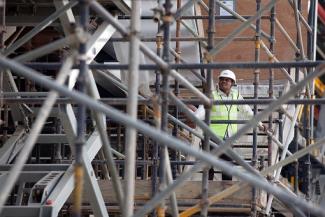Planning Law - Permission and Appeals explained
Judith Thompson 07-10-2022
A man in Walsall, Gurwinder Singh, was ordered to demolish his new house this year after he exceeded his planning permission, bulldozed his modest semi-detached house, and replaced it with a four-bedroom upgrade. While he had planning permission for an extension, he did not have the necessary permission for the new building. A retrospective planning application was rejected.
In East Devon recently, Justin Lacey was fined £4,500 and ordered to remove the static caravan in which he was living, along with a timber-clad generator shed and domestic paraphernalia, from land not meant for residential use. The development had been carried out without permission on land “in an unsuitable location”, according to councillor Eileen Wragg, chair of East Devon District Council’s Planning Committee. She added, “As a council, we have a duty to ensure that any development is in line with planning legislation and guidance.”
Whether renovating a house for sale, or planning to construct a new block of flats, almost all plans are governed by planning laws, and any local restrictions.
What is planning permission?
Planning permission consent obtained from a local authority which is necessary for the “carrying out of any development on land”, where development is defined as the “carrying out of building, engineering, mining or other operations in, on, over or under the land or the making of any material change in the use of any buildings or other land”.
Planning permission is generally granted by the local planning authority (LPA), in which case a planning application, seeking to establish whether the scale and nature of the proposed development is acceptable, will need to be submitted.
What are planning conditions?
When planning permission is granted, it is usually subject to conditions. Conditions must meet legal tests to ensure that they are necessary, relevant, appropriate, precise, fair and reasonable, and capable of enforcement.
Non-compliance with conditions granted on planning permission can give rise to enforcement action by the local planning authority, as in the cases above. Enforcement notices may be issued and non-compliance with an enforcement notice is a criminal offence.
What are planning restrictions?
Restrictions on building and construction work are much more comprehensive and detailed than planning laws. Building regulations, for instance, the rules governing the standard for design and construction of buildings, must be taken into account.
Planning restrictions are more stringent in conservation areas, for instance, and for listed buildings. Other permissions and restrictions that may apply relate to covenants and ‘private’ rights, rights of way, ancient monuments, protected species, trees and hedgerows, and party wall restrictions.
Local Authority Powers
The LPA has the power to make a number of decisions. It may grant planning permission unconditionally, grant planning permission subject to such conditions as it thinks fit, or refuse planning permission.
In making these decisions, it will take into consideration the Development Plan, so far as is material to the application; any local finance considerations, so far as is material to the application, and any other material considerations.
Planning Appeals
If your planning application is refused, you have the right to make an appeal to the Planning Inspectorate.
Usually, you will have 6 months from the date of a decision notice to file a planning appeal. However, if you have a Householder Application that was refused, then any appeal must be filed within 12 weeks.
A Householder Application can be used to apply for permission for works to alter or enlarge a single house, including works within the garden of a house (but not, for example, an adjoining paddock). These works might include improvements such as extensions, conservatories, loft conversions, dormer windows, alterations, fences, swimming pools, access for vehicles, and so on.
Judicial Review
If your planning application and planning appeal have both failed, you have the right to start Judicial Review proceedings, to ask a judge to look again at the case. You have to make your application for Judicial Review within six weeks of the Inspector's decision, which is a very tight time limit.
Planning can be a complex area. For further details and advice on all its aspects, contact Samuels.

